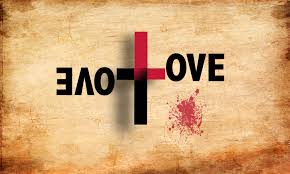All have sinned and fall short of the glory of God, being justified as a gift by His grace through the redemption which is in Christ Jesus; whom God displayed publicly as a propitiation in His blood through faith. This was to demonstrate His righteousness, because in the forbearance of God He passed over the sins previously committed; for the demonstration, I say, of His righteousness at the present time, so that He would be just and the justifier of the one who has faith in Jesus.
A rather dense paragraph of an ancient theological treatise, also known as Romans 3:23-26
A long time ago in a land far, far away there was a story. It was, so to speak, the greatest story ever told, and best of all, it was true. It was politically and culturally subversive, and explained much of what was wrong with the world, and pointed toward a solution that could really work. It was told in many ways and many languages and thousands of people believed in this story. It was beautiful, and the reception of this subversive story by so many was marvelous.
But there was a problem. This story was translated into many languages, and crossed many cultures and so it wasn’t as clearly understood by later generations as it was the first. The story was still openly received, and was clearly subversive, and it was still beautiful. But there was some disagreement about the point of the story. Some people thought it was judicial, some thought it was religious, and some thought it was ethical. That’s often the way of stories. They get over-analyzed and the further from the original cultural context it gets, the harder it is to say what the story is really about.
It was as if the story of “Little Red Riding Hood” was told in the context of a culture in which red hoods was a clear symbol of radical communism. The details of the story would still remain the same, but the point of the story could be radically different. Suddenly, Red becomes a naïve socialist activist, the wolf is the capitalist system, the grandmother is the helpless proletariat and the hunter is the Revolution. Or, if someone is a capitalist sympathizer, the whole story turns upside-down and the wolf is the victim and the hunter the evil Red Army.
This is what happened to the story of the cross.4
In different contexts the story of Jesus became a variety of things that wasn’t intended by the original storytellers.5 To be honest, the original point was SO subversive, SO radical that it couldn’t be understood at all by those not trained to look for it. Thus, the greatest minds in each culture set about deciphering the meaning of the Code of the Cross. And many of these meanings continue to have significance to today.
In the Ancient world, only a hundred years or so lived a Christian named Alexander.6 Alexander was a Gentile convert from paganism. And frankly, he understood paganism pretty well. Gods in the heavens controlled armies and major events on earth, creating chaos. Gods need to be placated and appeased in order to reduce that chaos to a minimum. However, many of these gods are capricious and just evil-minded, so pain, suffering, disease and death exist. Alexander then heard the gospel and realized that all of these gods are actually under the control of this mojo-evil god named Satan. And there is only one God in heaven, the Father, who has mercy on humanity, and who rules over Satan and all these evil gods. Jesus died to save us from our sins, which we committed under the rule of these gods. Alexander believed this wonderful story, and became a Christian—a completely subversive act in his day.
But he was still confused about one thing—how could Jesus dying actually save us from our sins? Yes, Alexander believed it was true, but it was all a little confusing. The sacrifices were used to placate these evil gods—what could Jesus’ sacrifice do to deliver us from sins? Alexander read most of the New Testament, but he was still confused. Then, in prayer one day, it was revealed to him what the story actually meant.

The real enemy of the story is Satan, the king of the gods, himself. Although the devil appears in the gospels rarely, all the evil characters were ultimately representing him. It is clear that all of these people, except Jesus himself, were enslaved to Satan— trapped, tortured and lied to. How did they get trapped? By their sin, of course! People’s sin against God transferred the rule under which they live from God to Satan. This is because Satan is the Father’s prosecuting attorney and executioner. Since sin results in death, God has the responsibility to take all of sinful humanity—all of humanity, in fact—and give them over to Satan.
But God was not content to leave humanity in this place, because he loved them so. He wanted them to not be under Satan, but under His own rule, His kingdom. But what could he do? Satan had legal rule over humanity, due to their sin. Ah, says God the Father, I know! The only way to release the captive is to placate the evil god, to offer him a ransom for the captives. What price would be equivalent for all humanity? Why, the death of his son, of course. And so God sent his son to die to pay the price to Satan to release humanity from captivity. And since Satan actually arranged Jesus’ death, he was ultimately defeated as ruler of humanity. Thus, through Jesus’ death, all of the pagan gods are defeated. And because Jesus willingly died, he becomes the Lord of all heavens at the side of God the Father.7
This is a great interpretation, and very attractive to those who were released from pagan beliefs. Alexander passed this understanding of Jesus’ death on. It moved like wildfire among the second century churches. Alexander never wrote this story down because the most effective means of communication in his day was not books, but oratory. So the story was passed on word of mouth. It wasn’t until Ignatius and Tertullian and others that this understanding was placed in a book. And by then, it so represented the meaning of the “gospel” that it was never actually explained, just referred to.
Many, many years later it was felt that Alexander’s explanation was inadequate. It was okay, in the eyes of many, but it had some holes in it. Over the years the story was revised and changed and adjusted and tweaked in such minor ways, that no one really thought they were changing it at all. Just making an adjustment. Finally, a guy named Anselm realized that the explanation of Jesus sacrifice was really quite different from what the early Christian writers understood. So he thought he would put it all down in one full story, along with all necessary explanations.
The story Anselm told had quite a different beginning point from Alexander’s. The significant figure that was harming humanity was not seen as Satan, as much as God the Father. This is not because God the Father hated humanity, on the contrary, he had a real emotional attachment to humanity. But, you see, God is a judge, and his hands are tied by the laws of the universe. The law of the universe is that if anyone acts in rebellion against the judge—God himself—then they must die. It is as simple as that. It is an automatic judicial process. God the Father would like to change the rules, but he can’t. Death must be paid for sin.

However, God also knew that the law had a loophole. You see, the way the law was worded—Death is the penalty for sin—doesn’t clearly say whose death was required. Ah ha! says God. This means that another can die for humanity. But who would pay this ultimate price? It must be someone innocent—someone who doesn’t have to pay for their own death. And it must be someone powerful—powerful enough that the one death would be payment enough for all of humanity. Who would do? Well, actually, thinks God—it must be Me. No one else can pay the price required.
Of course, God the Father can’t die—he’s awful busy judging and sustaining the universe. So it conveniently works that God actually has three persons—the Father, the Son and the Holy Spirit. So the Father caused the Son to become a human and to die, so that all of humanity might be delivered from death, the penalty for their sin.9
This is a powerful story, and one that took the Christian world on fire—even as Alexander’s did—and endures as the most popular understanding of Jesus’ death to this very day. This story became so significant culturally that it has been forgotten by the masses of believers in it that as an interpretation, it is not actually found in the New Testament.
And the story has been deemed inadequate by many Christians over the years.10 They do not like the image of God as judge, enforcing the ultimate death and torture of every human being. They do not like the fact that believing in Jesus’ death as the substitution for their penalty of sin doesn’t change people to be any better than before they believed in it. In other words, it speaks of how the penalty for sin is set aside, but not sin itself. So much of this story—as powerful as it is—seems so inadequate.

Abelard was a teacher and monk who didn’t live too many years apart from Anselm. He had a pretty spicy personal life that was told all throughout the medieval world—he and his girl Heloise—a nun— really had the hots for each other and wanted to get married. They chose to remain faithful to their vows of chastity, rather than break their covenant with God. Heloise was never completely satisfied with this solution, but Abelard—so deeply involved in theological circles—became as content as a cow in a field of clover and a nice looking bull just across the way.
Perhaps because he was trying so hard to forget Heloise, or perhaps his love for her colored all of his theology, Abelard took his frustrations out on Anselm’s understanding of Jesus’ death. Every time he read it, it made him upset. Where, Abelard complained, is the love? Isn’t God love? God is full of mercy and forgiveness and redemption—so why does Anselm’s story of atonement so lacking in love? It is a story of judicial wisdom, perhaps, and of theological mysticism, but there is no passion, no emotion. Also, Abelard says, everyone who believes in this story is grateful to such a God, but they remain in their sin. They have received an unbelievable grace, but there is no requirement to do anything different, to act as God desires us to act.

And so, Abelard wrote in Latin to his other companions in theology, let us set aside the myth of God’s jurisprudence. God’s desire is not so much that we have a penalty paid, but that we change behavior. Jesus’ primary message is not “receive grace” but “repent”. Jesus was sent, not as a scapegoat, a sacrifice for someone else’s sin—after all, sacrifices really did nothing in reality. Rather, Jesus was sent as the ultimate example. The ultimate example of love. Jesus was willing to sacrifice himself to show humanity that we need to live for others, not for ourselves. Jesus’ example is so extreme that anyone who desires to be like him even to the smallest degree would so love others that their lives would be changed. Jesus’ example was so powerful, that many saints lived their lives according to his principles and they showed others how the Christian life should be lived.11 Abelard was seen to be a heretic by many.12
And the debate rages on, for centuries, for millennia, as to the real meaning of Jesus’ death. One story gets passed for another which is revised for another. But the truth is so hard to find. Unless, of course, one looks at the gospels.
The “gospel” is often understood to be whatever interpretation of Jesus’ death is accepted by those who speak of it. Proof texts are pulled out, the more vague the better. And, somehow, those who believe in that interpretation are considered to be “saved”. Not, God forbid, if they just believe in Jesus himself, but in penal substitution, or Christus victor or ethical example atonement. As if often the case, Jesus is often traded in for the latest fad “gospel” that is to preached, enforced and sold.

The gospels are left behind. The first, best communication of Jesus is not understood, and so deemed inadequate. Few recommend the open reading of the gospels themselves without a guide to interpret it in accordance with the “right” interpretation. Why is this? Because the gospels do not clearly communicate any of these atonement theories that have been described above. Satan, in the gospels, is a minor character, who seems to take even more of a back seat during the passion of Christ than even the small role he plays during Jesus’ ministry. In the gospels, God is not represented as needing to punish, but as forgiving—and angry against some groups, but not humanity as a whole. In the gospels, love is a central theme of ethics, but it is rarely mentioned in conjunction with Jesus’ death—and there is certainly something else going on besides a debate about ethics at the heart of Jesus’ death. As it has often been stated, who would kill a guy who just said “wouldn’t it be nice if we loved each other more?”
There has got to be something more. Something we’ve been missing. Something subversive—because Jesus was killed as a rebel. Something radical—because Jesus had to die for it. Something beautiful—because Jesus’ death was meant to deliver us. And there is.
Notes
4. Well, actually, the story of Jesus never did become the story of the socialists. Depending on how you want to define "socialist", anyway. Jesus’ story could never be the story of the radical communists without some serious rewrite because he willingly submitted to his enemies. Marxism, Leninism, Maoism—they needed to promote the action of a violent, end-of-the-world-like revolution. Thus, while quietly denying the passiveness of Jesus, there were some who would uphold the story of the Exodus, especially in Latin America. Moses becomes the great leader and the violent themes become the revolution itself. Thus was Liberation Theology born.
5. Some would say that the New Testament clearly describes the purpose of Jesus’ death. That may be true, but most theologians, when describing the theology of Jesus’ death, ends up describing in detail a certain word or two that isn’t understood well. Or they focus on one word that has many meanings—whether in Greek or in English—and then demands that the word have one meaning. It is problematic when theology sounds like a used car salesman, highlighting certain aspects so we don’t notice others.
6. This isn’t his real name. Frankly, we don’t know what his real name is, or if it was a single person. However, we are going to use the name Alexander because it’s convenient for us. Also, because we like the alliteration. Sorry. I assume you’re reading this book because you like your theology covered with a good dollop of entertaining fiction. That’s what I like, anyway.
7. This interpretation of Jesus’ death is called the Christus Victor argument, and some form of it is usually understood to be the common interpretation of Jesus death from at least the time of the second century AD. Passages that confirm this view are: Genesis 3; Colossians 2:13-15; I John 3:8; Ephesians 2:1-7; Matt 5:25-26; Matt 12:29; Hebrews 2:14.
8. Anselm was a real person, in case you were wondering. And he really wrote a book. It’s called “Why Did God Become A Man” He wrote other books as well, but that’s the important one here.
9. Verses for Anselm’s view: Anselm’s view is the most prevalent view among Protestants today, and the most heard in “gospel presentations”. II Corinthians 5:21; Romans 3:25; Hebrews 2:17; I John 2:2; 4:10. Many use half of Paul’s letter to the Romans to support this view: a. God’s wrath is against the whole world—Gentiles and Jews—because of their sin (Romans 1-3); Through faith in Jesus’ death, God has established a means of salvation (Romans 4-5); Because of faith in Jesus’ death, God has given everyone the ability to live rightly before God (Romans 6-8).
10. The largest theological difficulty with Anselm’s interpretation is the wrath of God that demands the destruction of every single individual without hope of God’s forgiveness without a sacrifice—it proposes an “Old Testament God” that the Hebrew Scriptures don’t propose. Another difficulty is the acceptance of human sacrifice. But biblically, the difficulty with the view is the assumptions that get put with certain words. The term “for our sin” is assumed to mean “in place of us”, as if an exchange of punishments is assumed, when a more natural reading would be “because of our sin”. Another problem is the Greek word ilastrarios which is commonly translated “propitiation”, which is usually understood as a sacrifice to appease a god’s wrath. However, the word, in a general sense, means “the means to forgiveness” (see Louw and Nida, and the UBS lexicon). Thus, the passages are seeing Jesus’ death, in a general sense, being the means of forgiveness, but they don’t explain how that is done.
11. Some verses for Abelard’s view: John 15:13; Mark 8:34; Phil 2:3-11; I Peter 2:19-24. One of the main difficulties with Abelard’s view is that he is saying that Jesus’ death teaches us how to love, while these verses all promote Jesus’ death as an example for sacrifice and humility.
12. One of the main critiques of Abelard’s view is that it doesn’t really discuss past sin, or how Jesus obtains us freedom from that. Abelard’s view seems most separated from a Scriptural discussion of the atonement, except that it does express a theme of imitation that is discussed in the New Testament.


























